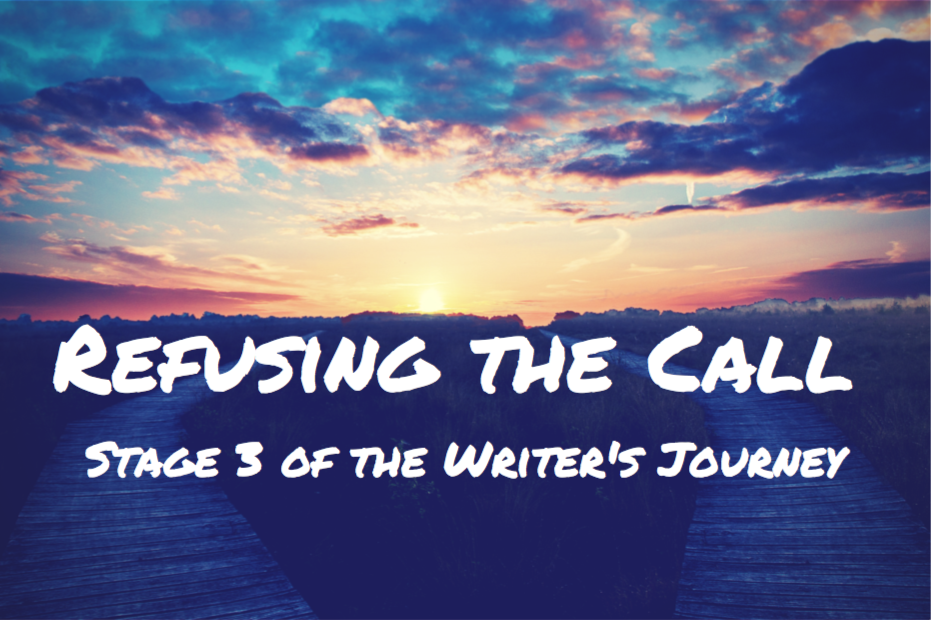Because everyone loves a good story
Stage Three: Refusal of the Call to Adventure

Let’s imagine that you’re a hero. Now, some people are born heroes, and others have heroism thrust upon them. You’re the second kind of hero.
So you’re living your life, minding your own business and trying to get from day to day just like the next guy. Your life isn’t perfect, but you have your routine and you’re managing to cope very nicely, thankyouverymuch. Sure, there are problems with the world, with your family, and maybe even with your own personality, although why that’s anyone else’s business is, quite frankly, beyond you. But for the most part, things are fine.
Suddenly you’re presented with a massive choice, an opportunity to make a change not just for yourself but for the world as you know it. It will be drastic, and you will never be the same when (or if) you return. Do you jump on the opportunity without hesitation? Or are you a little hesitant to commit to this mysterious and formidable quest? Most likely, the latter.
The Third Stage
Given that the second stage of the Hero’s Journey is the Call to Adventure, would you care to guess the third stage? You’ve got it—the Refusal of the Call. If you surmised that based on the normal, human reaction to a Call, then you’re a smarty pants. If you guessed that because you read my earlier article where I listed all 12 stages…you’re still a smarty pants, but you kind of cheated too.
Regardless, the Refusal of the Call is a common initial reaction for many heroes from myths to stories to films. “Refusal may be a subtle moment, perhaps just a word or two of hesitation between receiving and accepting a Call,” writes Vogler. “Refusal may be a single stop near the beginning of the journey, or it may be encountered at every step of the way, depending on the nature of the hero” (114).
But doesn’t the refusal make the hero less heroic? I don’t think so. In fact, Vogler says that “this doubt is more interesting than knowing that the hero will rise to every occasion. Such questions create emotional suspense for the audience, who watch the hero’s progress with uncertainty hanging in the back of their minds” (112).
Refusals Come in Different Shapes
Besides, the refusal doesn’t have to be an all-out tantrum. It may be just a brief moment of reluctance, like Jasmine’s slight hesitation before answering Aladdin’s “Do you trust me?” by jumping out a window with him. It could be an internal battle culminating in a difficult decision, like Frodo’s decision to take the ring to Mordor. And sometimes the hero just needs a little more motivation before he will accept the Call. Take, for example, Luke Skywalker in “A New Hope.” He isn’t ready simply to drop his boring but familiar life on Tatooine and follow Obi-Wan, all willy-nilly, into some intergalactic struggle. But when he returns home and finds nothing but the charred remains of his…er, former life, it flips a switch in him. He is suddenly ready to accept the Call to Adventure.
Examples from The Hobbit
In our hero Bilbo Baggins, we find a strong hesitation to join in on the foolhardy expedition proposed by Gandalf and the dwarves. He flat out refuses Gandalf’s original Call by saying, “’Sorry! I don’t want any adventures, thank you. Not today. Good morning!’” (6). The next day, however, the dwarves enter his home, eat his food, and pitch their proposition that Bilbo be the burglar on their adventure “’from which some of us, or perhaps all of us… may never return,’” Thorin adds (17). Bilbo’s Refusal of the Call is more emphatic this time. “At may never return he began to feel a shriek coming up inside, and very soon it burst out like the whistle of an engine coming out of a tunnel.” He collapses on the rug, “shaking like a jelly that was melting,” and later proceeds to sleep through their departure (17).
However, it would have been a short book indeed if Bilbo had stayed home with his warm fire, his arm chair, and his multitude of adequate handkerchiefs. This is why he soon entered the next stage of the Hero’s Journey, which is Meeting with the Mentor.
Today’s Question: Can you think of a hero who initially refuses the Call to Adventure? What is his or her reason for the refusal?
Sources:
Vogler, Christopher. The Writer’s Journey: Mythic Structure for Writers, Second Edition. Studio City: Michael Wiese Productions, 1998.
Tolkien, J.R.R. The Hobbit. New York: Ballantine Books, 1937.

Emily, I recently listened to a recording of Till We Have Faces (Audible free trial) while driving on a road trip, and as I read your blog I am trying to apply today’s question to that story…HELP!
Great question! I’m equally stumped. My only theory is that the Hero’s Journey applies best to adventure stories, and Till We Have Faces may not fit that bill. However, it is absolutely one of my all time favorites!! I’ll keep giving it some thought, though.
Great post, Emily! One of my fav books is Jurassic Park. Dr. Grant originally turned down the visit to JP because he was busy (and thought Hammond was crazy). 😉
Why am I not surprised that Jurassic Park is one of your favorites? 😉 That’s a great example! Thanks so much for posting!
I was thinking of King Arthur the movie by Guy Ritchie. (SPOILER ALERT) In his portrayal of King Arthur he doesn’t want to be king, he was pretty content running a brothel. Even when he saw how he was the heir to the thrown by pulling the sword from the rock it took a hard journey through the dark forest, a tragedy of losing friends, and finally seeing how his father died for him to answer the call.